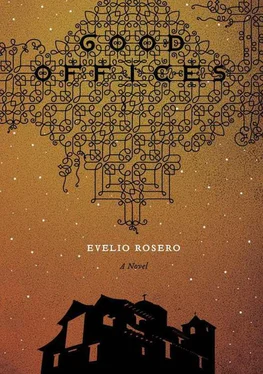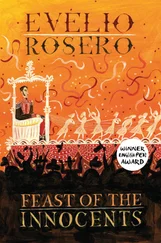Evelio Rosero
Good Offices
For Róbinson Quintero and Rafael del Castillo
. . this side of the head of God,
. . in the livid neck of the beast,
in the snout of the soul.
CÉSAR VALLEJO
He has a terrible fear of being an animal, especially on Thursdays, at lunchtime. “I have this fear,” he says to himself, and glimpses his hump reflected in the window. His eyes wander over his eyes: he does not recognize himself. What an other! he thinks. What an other! And examines his face. “On Thursdays,” and then, “this Thursday, especially, when it’s the old people’s turn.” Tuesdays for the blind, Mondays for the whores, Fridays for families, Wednesdays for the street kids, Saturdays and Sundays for God, or so says the priest. “To rest the spirits,” the Father asks him — or as good as asks him — to pray and swing the censer. Mass, Mass, Mass. There may be Mass every day — the Word of God — but every weekday lunchtime the parish church becomes a living hell. With midday meals like these, there is no eating in peace. They have their lunches. He has to keep an eye on things, take charge, from the outset. On Thursdays, especially, when he has a terrible fear of being an animal. At 10:00 in the morning, crowds of old people start pouring in from the four corners of the city, Bogotá spitting them out by the dozen. They form an impatient line, leaning against the church wall by the side door that leads to the dining hall and that only opens at 12:00 on the dot, come blazing sun or lashing hail like knife pricks. The old people cannot bear any kind of weather or tolerate the fact that the metal door opens only at midday: the line moans, grumbles, and curses. They are the only ones who forget that their lunch is another of Father Almida’s acts of charity. They protest as if outside a restaurant, as if they were paying customers. They act as though they were respected clients and he the maître d’, their waiter. “I’ll complain to your superior,” they yell. “We’ve come a long way,” “I want my soup; it’s getting late,” “I’m sick,” “I’m hungry,” “Open up, open up, I’m dying,” “Open up, I’m already dead.” And they do die, as a matter of fact: eleven old people have died in the three years since they began offering Father Almida’s Community Meals. They have died in the line or while eating, and Tancredo’s dreadful fear of being an animal redoubles: he has to telephone places where no one ever answers — doctors, police, the institutions and foundations with which the Father has an arrangement to provide support in such cases, worthy and charitable individuals who, if they do answer the telephone, become absent-minded just when they are most needed. “We’re on our way,” they say. “We’ll be there in no time.” “Just a minute.” But he must wait with the body for hours, in the same hall where the meals are served, he and the corpse similarly inert, each in his chair, the only guests at a table littered with leftovers, a funeral feast which the rest of the old people, despite one of their number having died, carry on eating, even mocking the deceased, helping themselves to the remains of his meal — “It’s no use to you now” — and stripping him of a hat, a scarf, a handkerchief or his shoes. Luckily for Tancredo, an old person does not die every Thursday. But this does not diminish his fear of becoming an animal. He is always afraid, he has this terrible fear, especially on Thursdays when the meal is over and he has to clear the hall. “Father Almida will expect you next week,” he says, and battle commences. A disconsolate din rattles the table, the plates, the cutlery. They are like stunned children. They implore him as if he were a relative, a memory: they call him extraordinary names, names he will dream of later and be unable to believe are real: Ehich, Schekinah, Ajin, Haytfadik . “You can’t possibly throw me out,” they say. Then the protests begin. Whimpering. Pleading. Whining. “I don’t want to leave. Where can I hide?” He must lift them up out of their chairs, all of them lethargic, most of them asleep, their stomachs full of soup and shredded pork: their food is served in the form of mush; they have no teeth, much less false ones, and on top of that they eat so slowly, on purpose, as if they never want to finish. Their meals are eternal. But they do finish, in spite of themselves; they finish and he must rouse them by shouting, round them up like reluctant cattle, even pick them up and carry them bodily from the hall, scare them away by clapping his hands and shoving them out of the church. “We’ll call Father Almida,” protest the ones who are most awake. “We’ll complain.” He pushes them out, one after the other, forced to play executioner; the old women try to bite him, hang on his neck, clutch at his hair, beg to see Father Almida, because they are his grandmothers, they say, his aunts, his mamás , his friends; they offer to work as servants in the church, as cooks or gardeners or seamstresses; some of them hide under the table, crouching and bristling like fiends, threatening with their fingernails; he has to get down on all fours, hunt them, pursue them, corner them, flush them out. And still his work is not done because even though most of the old people accept that they have to be gone until the following Thursday, there are always two or three dotted about the hall who pretend to be dead, or dying, and some have tricked him; sometimes they manage to confuse him and convince him. “We’ve died,” say the most guileless, giving themselves away. “I’m dead, leave me alone.” Others remain stock-still, stretched out on the cold brick floor — a pool of spilled soup and rice — eyes rolled back, limbs stiff. Tancredo puts his ear to their chests; he cannot hear their hearts, it always seems, so he resorts to ruses to unmask them, invoking the patience of Job; he tickles them, their dirty ears, their eyelashes, their stinking armpits and the soles of their feet, which smell a thousand times worse, poking his fingers into ancient shoes brimming with ants, damp with sweat, the leather cracked, the soles worn through by the years, shoes that are never taken off, like their socks — if they have any — and when he manages to reach skin it feels slippery, an icy cold that gives him gooseflesh, and he scratches at it roughly, hurriedly. Only if there is no response does he pinch them, and pinch again, and go on pinching — it is the ultimate test — until they moan, smile, laugh, softly at first, in distress, cry out, then shout, and then: “Leave me in peace, I died already,” and they insist: “Don’t touch me, I’m dead, I died, can’t you see?” and in the end become angry: “You killed me,” and insult him: “You damned hunchback bastard,” and this is when rage boils up in the pit of his stomach, and he fears becoming an animal and gnashing, biting, finishing off all these skeletons of men and women, who knows if they are children or old people, who knows if they are good or wicked, who knows what they are, but they harbour within them the world’s vilest evils. Father Almida says yet again: “Resign yourself, Tancredo,” and tells him that nothing is worse than old age, nothing more wretched or pitiable. “It is God’s last great test,” he says, and that is true, but there is nothing more dreadful than discovering whether they are dead or not, or more terrible than Tancredo’s fear of being an animal, because it falls to him to find them out, because he alone has to take charge of their meals, take charge of all the lunches, but most of all the old people’s meals, the elderly who become more numerous each time, the insolent old ones who pretend to be dead in order to enter the heaven of the parish church, and they exasperate him, they drive him crazy, they demoralize and crush him, because the worst thing is when an old person really has died and he has had to subject them — or rather, subject himself — to this insane, absurd, unavoidable test of tickling and pinching.
Читать дальше












